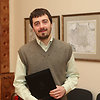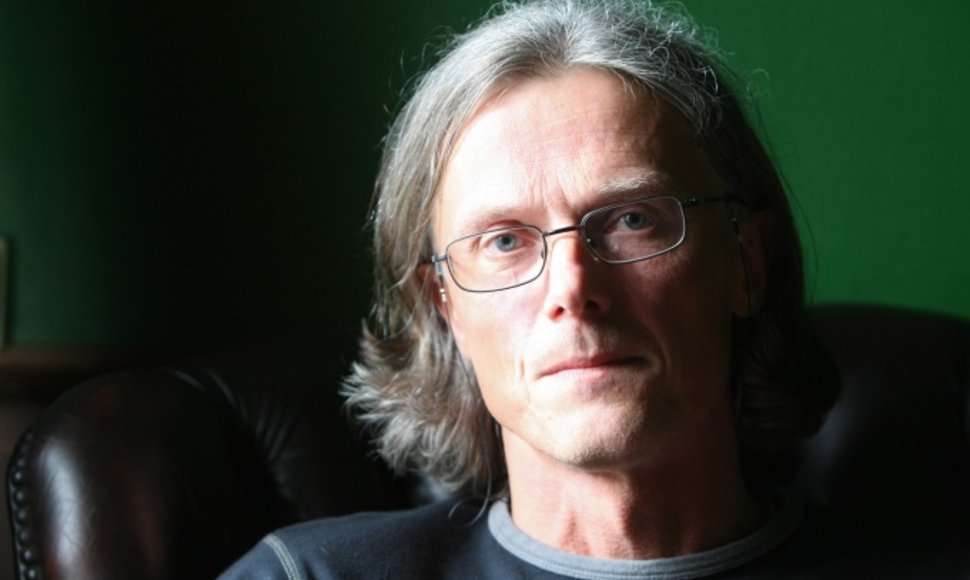I met with the poet to talk about things – not how they would be if they were, but how they are if they are.
- It is your wisdom / when you crucify in time / an escaping word / having all foreseen. These are lines from tour first 1991 poetry book, “Equinox.” What do you see to be poet's wisdom now – two decades, six poetry and three essay collections later?
- The word “wisdom” has always seemed important to me, but you hardly ever use it in life. It is easier to talk about stupidity and cleverness, even though it is wisdom that every human probably aspires to. When it comes to poetry, wisdom was and is important to me, even if I do not speak of it directly.
Much has changed over twenty years. I was more abstract in my young days. Not just because I cared more about theories, philosophy, metaphysics. It's simply that I used to imagine that poetry should be as abstract as possible, universal, purged of everyday rust.
But years have gone by and wisdom – or life's folly – took its toll. My understanding of poetry has changed. I grew interested in everyday things – trivia, details that gradually seeped into my writing. You could say I came out to the surface of life. But one should not equate surface with superficiality – it is rather the texture of life. When you speak of profundity, you always have a sense of defeat, since you cannot name it, so you take detours, you look for profundity in surface signs.
- In your latest books – collection of poetry “If” and essays “Street Between Two Churches” – it is the relation to the time past that matters. Is there some sort of a limit that a poet passes and stops looking ahead, turning back instead?
- It might have something to do with ageing, but in these books, I look back not only to take something from the past. I'm probably just a little late to start valuing the past, to reflect on it. It's true that a young person pays more attention to the future, he's not that concerned about what remains after he's gone.
And now I've become interested in what has happened in my life. I've realized that poetry cannot be universal and describe everyone's lives. Poetry, above all, is my life – one-off and unique. But as I write about my own life, I also narrate others, as people's lives often concur, intermingle. That's the essence of art.
- Eugenijus Ališanka did not do a degree in literature, but rather in mathematics. Are there still people who are surprised by this?
- Curious as it might seem, but that still happens quite often. I'm happy that at least literary critics stopped linking my oeuvre directly with mathematical, abstract, extremely logical thinking. I've said on numerous occasions that poetry does indeed require precision, but poetic logic and mathematical logic are two different things. One shouldn't link them.
- Is Eugenijus Ališanka himself surprised that he graduated from maths, not literature?
- Not much surprised, but it keeps crossing his mind that it might have been better if he had studied languages or Lithuanian literature. From professional perspective, it might have been more useful. He is not that surprised also because things he has been writing this last decade are his story and it cannot be rewritten. There's no point, since it is what it is.
- You've mentioned languages. You are among most translated Lithuanian poets. Your books have been published in seven languages, your poems have been translated into twenty-odd languages. Some critics maintain that your are better-known abroad than in Lithuania.
- To put it mildly, it is certainly not true. It's just that they have published a lot of my books abroad. It just happened. For instance, in Germany, they liked some of my texts and they wanted to publish more.
- Perhaps it has something to do with the abstractedness of poetry you've talked about before?
- Texts that were noted and got published are from my later oeuvre, the ones that are more particular. I don't think that translators or publishers were attracted to the universality of poetry. One translator put it simply: “I like it, it's interesting, that's why I'm translating it.” That's exactly what I do – when I'm doing translations, I'm choosing authors that are interesting to me.
- What else do you do besides writing and translating?
- My entire work revolves around words. Besides writing, I edit The Vilnius Review magazine. I used to have a job directly unrelated to literature. I spent ten years doing research at the Institute of Culture and Art, but I still wrote things that were close to literature.
- So you did not go back to maths?
- It always makes me laugh when someone asks me to do some quick calculations. They say: “Come on, you're a mathematician.” As I was finishing my studies, I got interested in humanities. Even though I was good at maths in school, I went to contests, but later I got tempted by literature, philosophy.
- Bearing in mind your education and academic career, it would be interesting to know whether the phrase “intellectual poetry” is not an oxymoron?
- Good poetry is intellectual. And it is so not courtesy of international words, names, the flow of scientific terms. Intellectual poetry is one that sees the world as a multiple space with innumerable links. The variety of these links is the poet's province. I'm most intrigued by finding links between world objects and language.
Poetry is the realm where one can seek the maximum. I recently watched a programme on surfers. They surf the waves that are several metres high. And all they're after comes down to staying erect. Yes, they compete for gold medals, but their primary goal is to catch the highest wave.
- On the topic of medals. You will soon be crowned the laureate of Poetry Spring. When I interview poets about prizes and public recognition, the answer I usually get is “prizes are unimportant – it is creating art that matters” or “I'm happy about being recognized, but I've nothing more to say.” Is it important for you being awarded?
- I would be lying if I said that it's not important at all. An award means that your work is recognized. I don't think there's an author who doesn't care about it one bit. Everyone needs recognition. And not only people who create.
Dossier
Eugenijus Ališanka is a poet, essayist, translator. He was born on 22 February 1960, in exile in Bernaul (Russia). Since 1962, he has been living and working in Vilnius.
He is a graduate of Vilnius University Faculty of Mathematics. 1990 to 2000 he worked as research assistant at the Institute of Culture and Art. 1994 to 2002 he worked as international projects director in the Lithuanian Writers Union, headed the Poetry Spring festival. Since 2003, he has been editor-in-chief of The Vilnius Review.
His literary début was a collection of poetry “Equinox” (1991) which was awarded the Zigmas Gėlė prize as the best first publication. In addition to poetry, he has published three collections of essays.
Ališanka's writing has been translated into twenty languages. It was published as separate books in Germany, Sweden, Russia, Bulgaria, Slovenia, and some other countries.
Ališanka himself is a translator from Polish and English. Among the authors he has translated are Zbigniew Herbert, Czeslaw Milosz, Wyslawa Szymborska, Aleš Debeljak, Derek Walcott, Jerome Rothenberg.













